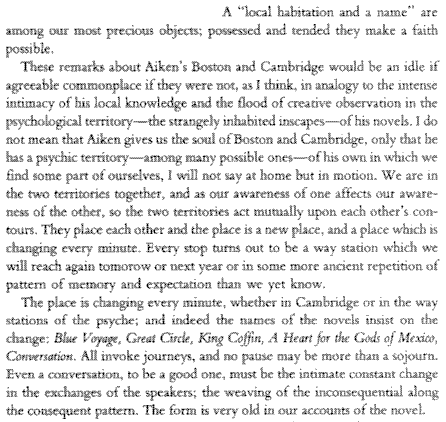“Wind over Water” in the I Ching,
the Classic of Transformations,
signifies huan, “dissolving.”
Dissolving:
These our actors,
as I foretold you,
were all spirits…
“Wind over Water” in the I Ching,
the Classic of Transformations,
signifies huan, “dissolving.”
Dissolving:
“The rock cannot be broken.
It is the truth.”
— Wallace Stevens,
“Credences of Summer,”
Spellbound, and
Quotes on Mathematics,
collected by
Peter Cameron.
John Cusack is 40,

(See midnight on
Midsummer’s Eve.)
“Like Gone with the Wind
on mescaline”
— a description of Savannah
Noon
in the Garden of
Good and Evil:

Related material
from December 2005:
Intelligence/Counterintelligence,
Prequel on St. Cecilia’s Day,
Intelligence/Counterintelligence
Continued
In memory of
Irving Kaplansky,
who died on
Sunday, June 25, 2006
“Only by the form, the pattern,
Can words or music reach
The stillness, as a Chinese jar still
Moves perpetually in its stillness.”
— T. S. Eliot
Kaplansky received his doctorate in mathematics at Harvard in 1941 as the first Ph.D. student of Saunders Mac Lane.
From the April 25, 2005, Harvard Crimson:
Ex-Math Prof Mac Lane, 95, Dies
Gade University Professor of Mathematics Barry Mazur, a friend of the late Mac Lane, recalled that [a Mac Lane paper of 1945] had at first been rejected from a lower-caliber mathematical journal because the editor thought that it was “more devoid of content” than any other he had read.“Saunders wrote back and said, ‘That’s the point,'” Mazur said. “And in some ways that’s the genius of it. It’s the barest, most Beckett-like vocabulary that incorporates the theory and nothing else.”
He likened it to a sparse grammar of nouns and verbs and a limited vocabulary that is presented “in such a deft way that it will help you understand any language you wish to understand and any language will fit into it.”
A sparse grammar of lines from Charles Sanders Peirce (Harvard College, class of 1859):
Related entry: Binary Geometry.
“Mr. Stuart was named Lionel Simon when he was born in Manhattan, the son of a salesman and a secretary. His father committed suicide when the boy was 6.”
Plato, Pegasus, and
the Evening Star,
and
See also two varieties of Hell,
from the New York Times on
Nov. 25, 2005, and yesterday.
A Little Extra Reading
In memory of
Mary Martin McLaughlin,
a scholar of Heloise and Abelard.
McLaughlin died on June 8, 2006.
"Following the parade, a speech is given by Charles Williams, based on his book The Place of the Lion. Williams explains the true meaning of the word 'realism' in both philosophy and theology. His guard of honor, bayonets gleaming, is led by William of Ockham."
A review by John D. Burlinson of Charles Williams's novel The Place of the Lion:
"… a little extra reading regarding Abelard's take on 'universals' might add a little extra spice– since Abelard is the subject of the heroine's … doctoral dissertation. I'd suggest the article 'The Medieval Problem of Universals' in the online Stanford Encyclopedia of Philosophy."
Michael L. Czapkay, a student of philosophical theology at Oxford:
"The development of logic in the schools and universities of western Europe between the eleventh and fifteenth centuries constituted a significant contribution to the history of philosophy. But no less significant was the influence of this development of logic on medieval theology. It provided the necessary conceptual apparatus for the systematization of theology. Abelard, Ockham, and Thomas Aquinas are paradigm cases of the extent to which logic played an active role in the systematic formulation of Christian theology. In fact, at certain points, for instance in modal logic, logical concepts were intimately related to theological problems, such as God's knowledge of future contingent truths."
The Medieval Problem of Universals, by Fordham's Gyula Klima, 2004:
"… for Abelard, a status is an object of the divine mind, whereby God preconceives the state of his creation from eternity."
Chess and Bingo
Chess: See Log24, Midsummer Day, 2003. Happy mate change, Nicole.
Bingo: See a journal entry from seven years ago, On Linguistic Creation. Happy birthday, Willard Van Orman Quine.
In memory of
Hunter S. Thompson
On Midsummer Day:
Big Time
Parts I, II, III
Part I:
April 17, 2003: Holiday Affair
Big Time, Part II:
April 16, 2003: Keeping Time
Big Time, Part III:
April 15, 2003: Green and Burning
"Man stands in his own shadow and wonders why it is dark."
— "Ancient Zen saying," according to "Today in History," June 24, by the Associated Press
"A man may be free to travel where he likes, but there is no place on earth where he can escape from his own Karma, and whether he lives on a mountain or in a city he may still be the victim of an uncontrolled mind. For man's Karma travels with him, like his shadow. Indeed, it is his shadow, for it has been said, 'Man stands in his own shadow and wonders why it is dark.'"
— Alan W. Watts, The Spirit of Zen, third edition, Grove Press, 1958, page 97
Robert Pirsig, Zen and the Art of Motorcycle Maintenance, 1974:
"But what's happening is that each year our old flat earth of conventional reason becomes less and less adequate to handle the experiences we have and this is creating widespread feelings of topsy-turviness. As a result we're getting more and more people in irrational areas of thought… occultism, mysticism, drug changes and the like… because they feel the inadequacy of classical reason to handle what they know are real experiences."
"I'm not sure what you mean by classical reason."
"Analytic reason, dialectic reason. Reason which at the University is sometimes considered to be the whole of understanding. You've never had to understand it really. It's always been completely bankrupt with regard to abstract art. Nonrepresentative art is one of the root experiences I'm talking about. Some people still condemn it because it doesn’t make 'sense.' But what's really wrong is not the art but the 'sense,' the classical reason, which can't grasp it. People keep looking for branch extensions of reason that will cover art's more recent occurrences, but the answers aren't in the branches, they're at the roots."

Related material:
D-Day Morning,
Figures of Speech,
Ursprache Revisited.
See also
the previous entry.
"Let the midnight special
shine her light on me."

For more on the
eight-point star of Venus,
see Bright Star.
Related material:
April 21-22, 2003.
Binary Geometry
There is currently no area of mathematics named “binary geometry.” This is, therefore, a possible name for the geometry of sets with 2n elements (i.e., a sub-topic of Galois geometry and of algebraic geometry over finite fields– part of Weil’s “Rosetta stone” (pdf)).
Examples:
Go with the Flow
The previous entry links to a document that discusses the mathematical concept of "Ricci flow (pdf)."
Though the concept was not named for him, this seems as good a time as any to recall the virtues of St. Matteo Ricci, a Jesuit who died in Beijing on May 11, 1610. (The Church does not yet recognize him as a saint; so much the worse for the Church.)
There was no Log24 entry on Ricci's saint's day, May 11, this year, but an entry for 4:29 PM May 10, 2006, seems relevant, since Beijing is 12 hours ahead of my local (Eastern US) time.

The relevance of this structure
to memory and to Chinese culture
is given in Dragon School and in
Geometry of the 4x4x4 Cube.
For some related remarks on
the colloquial, rather than the
mathematical, concept of flow,
see
Philosophy, Religion, and Science
as well as Crystal and Dragon.
Yesterday's entry on the 1865
remarks on aesthetics of
Gerard Manley Hopkins,
who later became a Jesuit,
may also have some relevance.
Beijing String continued…
A comment left at Peter Woit’s weblog:
Xinhua has a story from June 20 on Yau showing a video in Beijing of a talk by Hamilton on the Poincare conjecture. This Xinhua story is rather Sinocentric, but it is balanced nicely by a document from China’s Morningside Center of Mathematics that gives a more complete record of Hamilton’s talk.
Hopkins on Parallelism
“The structure of poetry is that of continuous parallelism, ranging from the technical so-called Parallelism of Hebrew Poetry and the antiphons of Church music up to the intricacy of Greek or Italian or English verse. But parallelism is of two kinds necessarily – where the opposition is clearly marked, and where it is transitional rather or chromatic. Only the first kind, that of marked parallelism is concerned with the structure of verse — in rhythm, the recurrence of a certain sequence of rhythm, in alliteration, in assonance and in rhyme. Now the force of this recurrence is to beget a recurrence or parallelism answering to it in the words or thought and, speaking roughly and rather for the tendency than the invariable result, the more marked parallelism in structure whether of elaboration or of emphasis begets more marked parallelism in the words and sense. And moreover parallelism in expression tends to beget or passes into parallelism in thought. This point reached we shall be able to see and account for the peculiarities of poetic diction. To the marked or abrupt kind of parallelism belong metaphor, simile, parable, and so on, where the effect is sought in likeness of things, and antithesis, contrast, and so on, where it is sought in unlikeness. To the chromatic parallelism belong gradation, intensity, climax, tone, expression (as the word is used in music), chiaroscuro, perhaps emphasis: while the faculties of Fancy and Imagination might range widely over both kinds, Fancy belonging more especially to the abrupt than to the transitional class.”
— From Gerard Manley Hopkins, “Poetic Diction,” 1865
For an application to Hopkins’s poetry, see an excerpt from Stephen Prickett, Words and the Word: Language, Poetics and Biblical Interpretation (Cambridge: Cambridge University Press, 1986).
See also the publisher’s description of Maria R. Lichtmann’s The Contemplative Poetry of Gerard Manley Hopkins, Princeton University Press, 1989.
“The history of topology dates back at least to the middle of the 18th century. One of its first major boosts came at the end of the 19th century, when Poincare was trying to understand the set of solutions to a general algebraic equation….”



| Oh, do not ask, “What is it?“ |
| Let us go and make our visit. |
| On Tuesday evening, the schedule says “Prof. Yau present his new research result,” which presumably will be about the proof of the Poincare conjecture. |
| Would it have been worth while, |
| To have bitten off the matter with a smile, |
| To have squeezed the universe into a ball |
| To roll it toward some overwhelming question…. |
|
Yau rated the conjecture as one of the major mathematical puzzles of the 20th Century. |
Snippets:
A Reply to John Updike
See Updike on digitized snippets.
The following four snippets were pirated from the end of MathPages Quotations, compiled by Kevin Brown.
They are of synchronistic interest in view of the previous two Log24 entries, which referred (implicitly) to a Poe story and (explicitly) to Pascal.
"That is another of your odd notions,"
said the Prefect, who had the fashion
of calling everything 'odd' that was
beyond his comprehension, and thus
lived amid an absolute legion of 'oddities.'
Edgar Allan Poe
I knew when seven justices could not
take up a quarrel, but when the parties
were met themselves, one of them
thought but of an If, as, 'If you said so,
then I said so'; and they shook hands
and swore brothers. Your If is the only
peacemaker; much virtue in If.
Shakespeare
I have made this letter longer than usual
because I lack the time to make it shorter.
Blaise Pascal
S'io credessi che mia risposta fosse
a persona che mai tornasse al mondo,
questa fiamma staria senza piu scosse.
Ma per cio che giammai di questo fondo
non torno vivo alcun, s'i'odo il vero,
senza tema d'infamia ti rispondo.
Dante, 1302
For translations of the Dante (including one by Dorothy Sayers), see everything2.com.
An anonymous author there notes that Dante describes a flame in which is encased a damned soul. The flame vibrates as the soul speaks:
If I thought that I were making
Answer to one that might return to view
The world, this flame should evermore
cease shaking.
But since from this abyss, if I hear true,
None ever came alive, I have no fear
Of infamy, but give thee answer due.
-- Dante, Inferno, Canto 27, lines 61-66,
translated by Dorothy Sayers
“Yes, there is a ton of information on the web but much of it is grievously inaccurate, unedited, unattributed and juvenile. The electronic marvels that abound around us serve, I have the impression, to inflame what is most informally and non-critically human about us. Our computer screens stare back at us with a kind of giant, instant aw-shucks, disarming in its modesty.”
Note Updike’s use of “inflame.”
For an aw-shucks version of “what is most informally and non-critically human about us,” as well as a theological flame, see both the previous entry and the above report from Hell.
Note that the web serves also to correct material that is inaccurate, unedited, unattributed, and juvenile. For examples, see Mathematics and Narrative. The combination of today’s entry for Pascal’s birthday with that web page serves both to light one candle and to curse the darkness.
“A Pascal Candle can be found

The personae of summer
play the characters
Of an inhuman author,
who meditates
With the gold bugs,
in blue meadows,
late at night.
— Wallace Stevens,
“Credences of Summer,”
Canto X, Collected Poetry
and Prose, 322-326
“He spent his earliest years in post WWII–refugee camps. He came to America and grew up in Cleveland–stealing cars, rolling drunks, battling priests, nearly going to jail. He became the screenwriter of the worldwide hits Basic Instinct, Jagged Edge, and Flashdance. He also wrote the legendary disasters Showgirls and Jade. The rebellion never ended, even as his films went on to gross more than a billion dollars at the box office and he became the most famous–or infamous–screenwriter in Hollywood. Joe Eszterhas is a complex and paradoxical figure: part outlaw and outsider combined with equal parts romantic and moralist. More than one person has called him ‘the devil.’ He has been referred to as ‘the most reviled man in America.’ But Time asked, ‘If Shakespeare were alive today, would his name be Joe Eszterhas?'”
— Random House promotional material
“Yea, though I walk
through the valley of death
I will fear no evil,
for I am the meanest
son of a bitch
in the valley.”
in The Silver Crown,
by Joel Rosenberg
Part I:
The Game
Part II:
Many People

For further details,
see Solomon’s Cube
and myspace.com/affine.
“The rock cannot be broken.
It is the truth.”
— Wallace Stevens
For Bloomsday 2006:
Hero of His Own Story
"The philosophic college should spare a detective for me."
— Stephen Hero. Epigraph to Chapter 2, "Dedalus and the
Beauty Maze," in Joyce and Aquinas, by William T. Noon, S. J.,
Yale University Press, 1957 (in the Yale paperback edition of
1963, page 18)
"Dorothy Sayers makes a great deal of sense when she points out
in her highly instructive and readable book The Mind of the Maker
that 'to complain that man measures God by his own measure is
a waste of time; man measures everything by his own experience;
he has no other yardstick.'"
— William T. Noon, S. J., Joyce and Aquinas (in the Yale paperback
edition of 1963, page 106)
Related material:
Baez Link
John Baez’s latest This Week’s Finds
(Week 234, June 12, 2006) has a link
to my “Geometry of the 4×4 Square” at
http://finitegeometry.org/sc/16/geometry.html.
On the Brighter Side…
At 8 EDT tonight on CBS:
The American Film Institute’s
100 most inspiring American films.
For the list of 300 films on
the AFI ballot sent to voters,
click here (pdf, 772k).


Hypercube and Cube

For every kind of vampire,
there is a kind of cross.
— Gravity’s Rainbow

Kate Beckinsale, poster for
Underworld: Evolution
(DVD release date 6/6/6)
evolve:
1641, “to unfold, open out, expand,”
from L. evolvere “unroll,” from ex- “out”
+ volvere “to roll” (see vulva).
— Online Eymology Dictionary
Related material:
Introduction to Multispeech,
All Hallows’ Eve, 2005
Related material on philosophy:
The death of Hollywood agent
Ingo Preminger, brother of
Otto Preminger, on June 7,
the Log24 entry of June 7,
Figures of Speech, and
Ingo Preminger was also
the producer of the 1970 film MASH.
Related material on brotherhood
and the Korean War:
— From page 2 of
Problems of Mysticism
and Its Symbolism, by
Herbert Silberer, 1914
(English translation
published in 1917)
“And we may see
the meadow in December,
icy white and crystalline.”
— Johnny Mercer,
“Midnight Sun“
— Silberer, Problems of Mysticism online
Ursprache Revisited
"Rilke's poems operate at this balancing point between openness and closure, between centripedal and centrifugal motion, the poem being all symbol and being all object. Rilke developed the inwardness of poetry begun in Baudelaire and refined in Mallarmé into new depths of self-referentiality. Verinnerlichung was the term for this transmutation from outer to inner…."
— Rainer Maria Rilke: Life and Work,
by Jeremy Robinson
Related material: Herbert Silberer on Verinnerlichung in Problems of Mysticism and the Log24 entry Figures of Speech of 10 AM Wednesday, June 7– the date of death of theatrical agent Howard Rosenstone. See also the work of playwrights Donald Margulies and William Finn, clients of Rosenstone.
For Margulies, see a review of "Brooklyn Boy"—
"It's like stringing beads on a necklace. By the time the play ends, you have the whole necklace. But it's not like a typical play, where you know where you're going at the end of Act I. In this case, you'll learn something in one scene that will make you realize Eric was lying in a previous scene. And the play is partly about the lies we tell each other, the lies we tell ourselves and the identity we project to other people." — Actor Robert Gomes

Today’s birthday: Harrison Ford is 61.
7-11 Evening Number: 000. From the conclusion of “I know what ‘nothing’ means, |
College teachers — Fiction.
Good and evil — Fiction.
Philologists — Fiction.
Linguists — Fiction.
TIME magazine, issue dated June 12, 2006, item posted Sunday, June 4, 2006:
IF AT FIRST YOU DON'T SUCCEED …
By JULIE RAWE
"Nervous kids and obscure words are not the stuff of big-time TV, but this year's Scripps National Spelling Bee was an improbable nail-biter. One of the 13 finalists got reinstated after judges made a spelling error, a Canadian came in second–who knew foreign kids could compete?–and KATHARINE CLOSE, 13, prevailed in her fifth year. The eighth-grader from Spring Lake, N.J., won with ursprache. It means protolanguage. Now try to use it in conversation."
— Heidegger, Erlauterungen
zu Holderlins Dichtung.
Frankfurt am Main:
Klostermann, 1971: 41.

(Skewed Mirrors,
Sept. 14, 2003)
"Evil did not have
the last word."
— Richard John Neuhaus,
April 4, 2005
"This is the exact opposite
of what echthroi do in
their X-ing or un-naming."
— Wikipedia on
A Wind in the Door
|
"Lps. The keys to. Given! A way a lone a last a loved a long the PARIS, 1922-1939" — James Joyce, Finnegans Wake |
"There is never any ending
to Paris."
— Ernest Hemingway
Review: ART WARS
on Sept. 12, 2002:

Und was fur ein Bild des Christentums
ist dabei herausgekommen?
(Pentecost was Sunday, June 4, 2006.
The following Monday was formerly a
French public holiday.)
This morning's meditation:
Sous Rature
"… words must be written
sous rature, or 'under erasure.'"
— Deconstruction:
Derrida, Theology,
and John of the Cross

The above Bild, based
on Weyl's Symmetry,
might be titled
Rature sous Rature.
“Stuff comes up,
weird doors open,
people fall into things.”
— David Sedaris,
baccalaureate address
at Princeton on Sunday,
June 4, 2006,
the Feast of Pentecost
— Walker Percy, The Message in the Bottle: How Queer Man Is, How Queer Language Is, and What One Has to Do with the Other. New York: Farrar, Straus, and Girox, 1975, page 29.
Sermon
Baccalaureate:
A farewell address
in the form of a sermon
delivered to a graduating class.
"Stuff comes up,
weird doors open,
people fall into things."
— David Sedaris,
baccalaureate address
at Princeton yesterday
"The truth is that man's capacity for symbol-mongering in general and language in particular is so intimately part and parcel of his being human, of his perceiving and knowing, of his very consciousness itself, that it is all but impossible for him to focus on the magic prism through which he sees everything else."
— Walker Percy, The Message in the Bottle: How Queer Man Is, How Queer Language Is, and What One Has to Do with the Other. New York: Farrar, Straus, and Giroux, 1975, page 29.
Review: ART WARS
on Sept. 12, 2002:

Und was für ein Bild des Christentums
ist dabei herausgekommen?
Voilà:

Related material:
Bright Star.


Adapted from the
cover of Alan Watts’s
The Spirit of Zen

Romani flag, courtesy of

myspace.com/RomArmando
Related material:
“The Scholar Gypsy”
in The Oxford Book
of English Prose, 1923,
edited by
Sir Arthur Quiller-Couch
This is available online:
From The Vanity of Dogmatizing,
by Joseph Glanvill
(London, printed by E.C. for
Henry Eversden at the Grey-Hound
in St.Pauls-Church-Yard, 1661)
Pages 195-201:
That one man should be able to bind the thoughts of another, and determine them to their particular objects; will be reckon’d in the first rank of Impossibles: Yet by the power of advanc’d Imagination it may very probably be effected; and story abounds with Instances. I’le trouble the Reader but with one; and the hands from which I had it, make me secure of the truth on’t. There was very lately a Lad in the University of Oxford, who being of very pregnant and ready parts, and yet wanting the encouragement of preferment; was by his poverty forc’d to leave his studies there, and to cast himself upon the wide world for a livelyhood. Now, his necessities growing dayly on him, and wanting the help of friends to relieve him; he was at last forced to joyn himself to a company of Vagabond Gypsies, whom occasionally he met with, and to follow their Trade for a maintenance. Among these extravagant people, and by the insinuating subtilty of his carriage, he quickly got so much of their love, and esteem; as that they discover’d to him their Mystery: in the practice of which, by the pregnancy of his wit and parts he soon grew so good a proficient, as to be able to out-do his Instructors. After he had been a pretty while exercis’d in the Trade; there chanc’d to ride by a couple of Scholars who had formerly bin of his acquaintance. The Scholars had quickly spyed out their old friend, among the Gypsies; and their amazement to see him among such society, had well-nigh discover’d him: but by a sign he prevented their owning him before that Crew: and taking one of them aside privately, desired him with his friend to go to an Inn, not far distant thence, promising there to come to them. They accordingly went thither, and he follows: after their first salutations, his friends enquire how he came to lead so odd a life as that was, and to joyn himself with such a cheating beggarly company. The Scholar-Gypsy having given them an account of the necessity, which drove him to that kind of life; told them, that the people he went with were not such Impostours as they were taken for, but that they had a traditional kind of learning among them, and could do wonders by the power of Imagination, and that himself had learnt much of their Art, and improved in further than themselves could. And to evince the truth of what he told them, he said, he’d remove into another room, leaving them to discourse together; and upon his return tell them the sum of what they had talked of: which accordingly he perform’d, giving them a full acount of what had pass’d between them in his absence. The Scholars being amaz’d at so unexpected a discovery, ernestly desir’d him to unriddle the mystery. In which he gave them satisfaction, by telling them, that what he did was by the power of Imagination, his Phancy binding theirs; and that himself had dictated to them the discourse, they held together, while he was from them: That there were warrantable wayes of heightening the Imagination to that pitch, as to bind anothers; and that when he had compass’d the whole secret, some parts of which he said he was yet ignorant of, he intended to give the world an account of what he had learned.
Now that this strange power of the Imagination is no Impossibility; the wonderful signatures in the Foetus caus’d by the Imagination of the Mother, is no contemptible Item. The sympathies of laughing & gaping together, are resolv’d into this Principle: and I see not why the phancy of one man may not determine the cogitation of another rightly qualified, as easily as his bodily motion. This influence seems to be no more unreasonable, then [sic] that of one string of a Lute upon another; when a stroak on it causeth a proportionable motion in the sympathizing confort, which is distant from it and not sensibly touched. Now if this notion be strictly verifiable; ’twill yeeld us a good account of how Angels inject thoughts into our minds, and know our cogitations: and here we may see the source of some kinds of fascination. If we are prejudic’d against the speculation, because we cannot conceive the manner of so strange an operation; we shall indeed receive no help from the common Philosophy: But yet the Hypothesis of a Mundane soul, lately reviv’d by that incomparable Platonist and Cartesian, Dr. H. More, will handsomely relieve us. Or if any would rather have a Mechanical account; I think it may probably be made out some such way as follow. Imagination is inward Sense. To Sense is required a motion of certain Filaments of the Brain; and consequently in Imagination there’s the like: they only differing in this, that the motion of the one proceeds immediately from external objects; but that of the other hath its immediate rise within us. Now then, when any part of the Brain is stringly agitated; that, which is next and most capable to receive the motive Impress, must in like manner be moved. Now we cannot conceive any thing more capable of motion, then the fluid matter, that’s interspers’d among all bodies, and contiguous to them. So then, the agitated parts of the Brain begetting a motion in the proxime Aether; it is propagated through the liquid medium, as we see the motion is which is caus’d by a stone thrown into the water. Now, when the thus moved matter meets with anything like that, from which it received its primary impress; it will proportionably move it, as it is in Musical strings tuned Unisons. And thus the motion being convey’d, from the Brain of one man to the Phancy of another; it is there receiv’d from the instrument of conveyance, the subtil matter; and the same kind of strings being moved, and much of whay after the same manner as in the first Imaginant; the Soul is awaken’d to the same apprehensions, as were they that caus’d them. I pretend not to any exactness or infallibility in this account, fore-seeing many scruples that must be removed to make it perfect: ‘Tis only a hint of the possibility of mechanically solving the Phaenomenon; though very likely it may require many other circumstances completely to make it out. But ’tis not my business here to follow it: I leave it therefore to receive accomplishment from maturer Inventions.
Jeremy Pearce in this morning's New York Times:
"Dr. Fritz Klein, a psychiatrist and sex researcher who studied bisexuals and their relationships and later helped start a foundation for promoting bisexual culture, died on May 24 at his home in San Diego. He was 73. The cause was a heart attack, said his companion, Tom Reise."
(Click to see the larger original,
a photo by Michael Trezzi)
|
"The Waste Land," |
|
|
The sea was calm, your heart would have responded |
420 |
| Gaily, when invited, beating obedient | |
| To controlling hands | |
| I sat upon the shore | |
| Fishing, with the arid plain behind me | |
| Shall I at least set my lands in order? | 425 |
|
Eliot's note on line 424: |
|
|
"The Fisher King,"
"Did you lose your mind
"Well, I'm a singer by trade.
Then one night, in the What does all this mean?
I mean, that, |

From eudaemonist.com,
a quotation from
Paul Zanker's
The Mask of Socrates:
Benjamin was a Jewish Marxist. For a Jewish perspective on spelling, see Log24, Nov. 11, 2005. For a leftist perspective on Benjamin and last night's crucial spelling word "Ursprache," see "Ground Zero, an American Origin," by Mary Caputi (Poroi, 2, 1, August 2003):
The Baroque sensibility of ruin emphasizes a meaninglessness that too many possibilities deliver. Aimlessness and malaise make life into exhausting toil in the absence of coherence. In overdetermined realities, meaning appears arbitrary and erratic, as the world's connection to God seems lost or withheld. At the extreme, everyday life is as full of noise and commotion as it is devoid of intrinsic meaning. Connections among people wither with the onset of overabundance and despair. Recognition of this condition induces acedia, a weariness of life. Here the malaise of modernity and ruins ties to Benjamin's interest in Trauerspiel, German tragic drama, and the tragedies of Shakespeare. All respond to a plague of lost spiritual connections and a meaningless earthly existence where incessant toil and trouble — "tomorrow and tomorrow and tomorrow" — contribute to a chronic, wearing sense of pain.
Benjamin's interest in this form of melancholia, from suffering a sort of spiritual exile, is evident in his 1916 essay "On Language as Such and On the Language of Man." In this text, he explains that the Ursprache, our "original" language, is "blissful" precisely because it lacks the arbitrariness that results from overdetermination. Ur-speech is Adamic language, the linguistic power that God gives to Adam to confer identity on the material world. It contains no arbitrary component, but reveals the unity between God's divine plan and the world as it exists. Before ruins and fragments, there is no overdetermination to induce the melancholy of acedia. Instead the originary language implies a unity of transcendent and immanent realms. "With the creative omnipotence of language it begins, and at the end of language, as it were, assimilates the created, names it. Language is therefore both the creative and the finished creation; it is word and nature."6
This blissful state between the world and its creator as expressed in Adamic language has its end, of course, in the Fall. The "ignorance" introduced into the world that ultimately drives our melancholic state of acedia has its inception with the Fall away from the edenic union that joins God's plan to the immediacy of the material world. What ensues, says Benjamin, is an overabundance of conventional languages, a prattle of meanings now localized hence arbitrary. A former connection to a defining origin has been lost; and an overdetermined, plethoric state of melancholia forms. Over-determination stems from over-naming. "Things have no proper names except in God. . . . In the language of men, however, they are overnamed." Overnaming becomes "the linguistic being of melancholy."7
6 Walter Benjamin, "On Language as Such and On the Languages of Man," Edmund Jephcott, tr., Walter Benjamin, Selected Writings, Volume I: 1913-1926, Marcus Bullock and Michael W. Jennings, eds., Cambridge, MA, Harvard University Press, 1997, p. 68. 7 Ibid., p. 73.
For a Christian perspective on Adamic language, see Charles Williams's The Place of the Lion.
Float like a butterfly,
sting like a
“Float like a butterfly,
sting like a bee.”
— Muhammad Ali
Related material:
Log24 on the
Feast of the Transfiguration
(Aug. 6, 2002) and
Bee Season
(Nov. 12, 2005,
with the four entries
that preceded it).
See also
Spelling Champ
Masters “Ursprache.”

Location, Location, Location
(continued from previous entry):

— From page 276 (pdf) of
Outsider at the Heart of Things:
Essays by R. P. Blackmur,
University of Illinois Press, 1989
Powered by WordPress